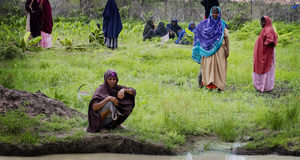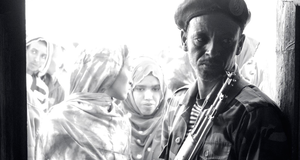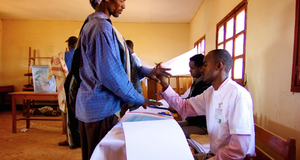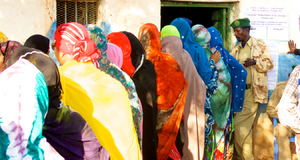Somali Piracy: Causes and Consequences
By
2011, Vol. 3 No. 09 | pg. 2/2 | « The origin of Somali piracy also has a history of outside involvement. The first Somali pirates were simply reacting to illegal fisheries, but the military skill involved in taking over a large commercial ship doesn’t come from nowhere. A 2009 Al Jazeera report found that a private British company, Hart Security, provided military training to Somali fisherman in the 1990’s in an effort to create a “Fisheries Protection Agency”24. The bulk of training was dedicated towards “how to handle weapons and board boats at high sea”25 – the exact tactics currently used by Somali pirates. However, today the company no longer condones piracy. In fact, they make millions providing security for commercial boats against the very pirates they inadvertently trained – an ethical conundrum that doesn’t concern CEO Richard Bethell.26 Thus the current state of Piracy in Somalia is one rooted in historical instability, and encouraged by the potential for massive profits. But such interruption in international trade has not gone unaddressed by the global community. The Somali piracy problem has, in fact, inspired a rare cooperation among nations with otherwise testy relationships. Although the United Nations, European Union, African Union, Arab League of Nations and NATO have organized numerous efforts to combat piracy, only three main operations remain active: Combined Task Force 150, Combined Task Force 151 and Operation Atalanta.27 In addition, a number of independent countries, such as Australia and China, have coordinated anti-pirate military efforts.Such efforts, however, provide only a temporary solution – a reality that the United Nations has accepted. In 2008, the UN Director on Drugs and Crime, Antonio Maria Costa, emphasized the re-capture of ransom funds from banks and financial intermediaries that pirates use to transfer profits.28 On April 13th, 2011, a UN forum on Somalia proposed the creation of regional Somali courts to try convicted pirates.29 In addition, there was agreement on the need to extend support for the Transitional Federal Government, and to encourage peace negotiations between the country’s warring factions.30 Unfortunately, the political situation in Somalia is as unstable as ever, with war between Al Shabaab and the Transitional Federal Government spilling over into neighboring Kenya.31 In addition, as long as piracy remains a profitable and viable source of income, the incentive to participate will only grow. Military intervention, whether it be directly attacking Somali pirates or simply escorting commercial ships, only temporarily addresses the issue and runs the risk of festering anti-Western public opinion among Somalis. In order to truly address Somali pirating, efforts must be concentrated towards the root of the problem: the collapse of the Somali state. Unfortunately, the hard truth is that nations capable of making real change in Somalia are far more interested in trade revenue than humanitarian efforts. The key to inspiring true international intervention is convincing such nations that these interests are aligned; that the stabilization of Somalia is key to the elimination of piracy on its coasts. If organizations such as the UN can accept this connection, and make real efforts toward instituting a successful Somali government, the economic necessity for piracy – and thus piracy itself – will naturally dissolve and cease to exist. Endnotes1.) Gill, Sharon. "Maritime Piracy Costs Global Community up to $12 Billion a Year."Eyefortransport | News, Analysis & Events. 20 Jan. 2011. Web. 14 Apr. 2011. 2.) Ibid. 3.) Anonymous. "Somalia's Civil War: A Bloody Border | The Economist." (2011).The Economist World News, Politics, Economics, Business & Finance. 31 Mar. 2011. Web. 11 Apr. 2011. 4.) Anonymous. "UN Envoy Decries Waste Dumping Off Somalia."Middle East Online. 26 July 2008. Web. 16 Apr. 2011 5.) Ahmed, Mohamed. "Somali Sea Gangs Lure Investors at Pirate Lair."Reuters - Business & Financial News, Breaking US & International News. 01 Dec. 2009. Web. 14 Apr. 2011. 6.) Associated Press. "Somali Pirates Get Help from Expats in Canada"The Star – News, Toronto, GTA, Sports, Business, Entertainment, Canada, World, Breaking. 11 Dec. 2008. Web. 16 Apr. 2011. 7.) Harper, Mary. "Chasing the Somali Piracy Money Trail."BBC News. 24 May 2009. Web. 16 Apr. 2011. 8.) Harding, Andrew. "Postcard from Somali Pirate Capital."BBC News. 16 June 2009. Web. 16 Apr. 2011. 9.) U.S. DOS. "Somalia - Profile."U.S. Department of State. 13 Feb. 2011. Web. 16 Apr. 2011. 10.) Ibid. 11.) Ibid. 12.) Ibid. 13.) Economist, Ibid. 14.) Anonymous. "Somalia Politics, Government, and Taxation."Encyclopedia of the Nations. 23 Mar. 2009. Web. 17 Apr. 2011. 15.) Economist, Ibid. 16.) Gettleman, Jeffrey. "Somali Pirates Tell Their Side - They Want Only Money."The New York Times – Breaking News, World News & Multimedia. 30 Sept. 2008. Web. 17 Apr. 2011. 17.) Shabazz, Saeed. "Somali Piracy Connected to Toxic Dumping, Illegal Fishing."FinalCall.com News - Uncompromised National and World News and Perspectives. 20 Nov. 2008. Web. 17 Apr. 2011. 18.) Gill, Ibid. 19.) Middle East Online, Ibid. 20.) Harding, Ibid. 21.) Harper, Ibid. 22.) Harper, Ibid. 23.) Harper, Ibid. 24.) Al Jazeera, English. "Firms Reap Somali Piracy Profits - Africa."Al Jazeera English. 9 Sept. 2009. Web. 17 Apr. 2011. 25.) Ibid. 26.) Ibid. 27.) Anonymous. "NATO Topics: NATO Assistance to African Union Missions."North Atlantic Treaty Organization Website. Web. 17 Apr. 2011. 28.) Anonymous. "Regional Approach Crucial to Bring Somali Pirates to Justice, Says UN Anti- crime Chief."United Nations Online. 16 Dec. 2008. Web. 17 Apr. 2011. 29.) Anonymous. "Security Council to Consider Plans for Specialized Somali Courts to Try Pirates."United Nations Online. Web. 17 Apr. 2011. 30.) Anonymous. "UN-backed Forum Identifies Areas of Common Ground on Ending Somalia’s Transition."United Nations Online. Web. 17 Apr. 2011. 31.) Economist, Ibid. Suggested Reading from Inquiries Journal
Inquiries Journal provides undergraduate and graduate students around the world a platform for the wide dissemination of academic work over a range of core disciplines. Representing the work of students from hundreds of institutions around the globe, Inquiries Journal's large database of academic articles is completely free. Learn more | Blog | Submit Latest in International Affairs |


















